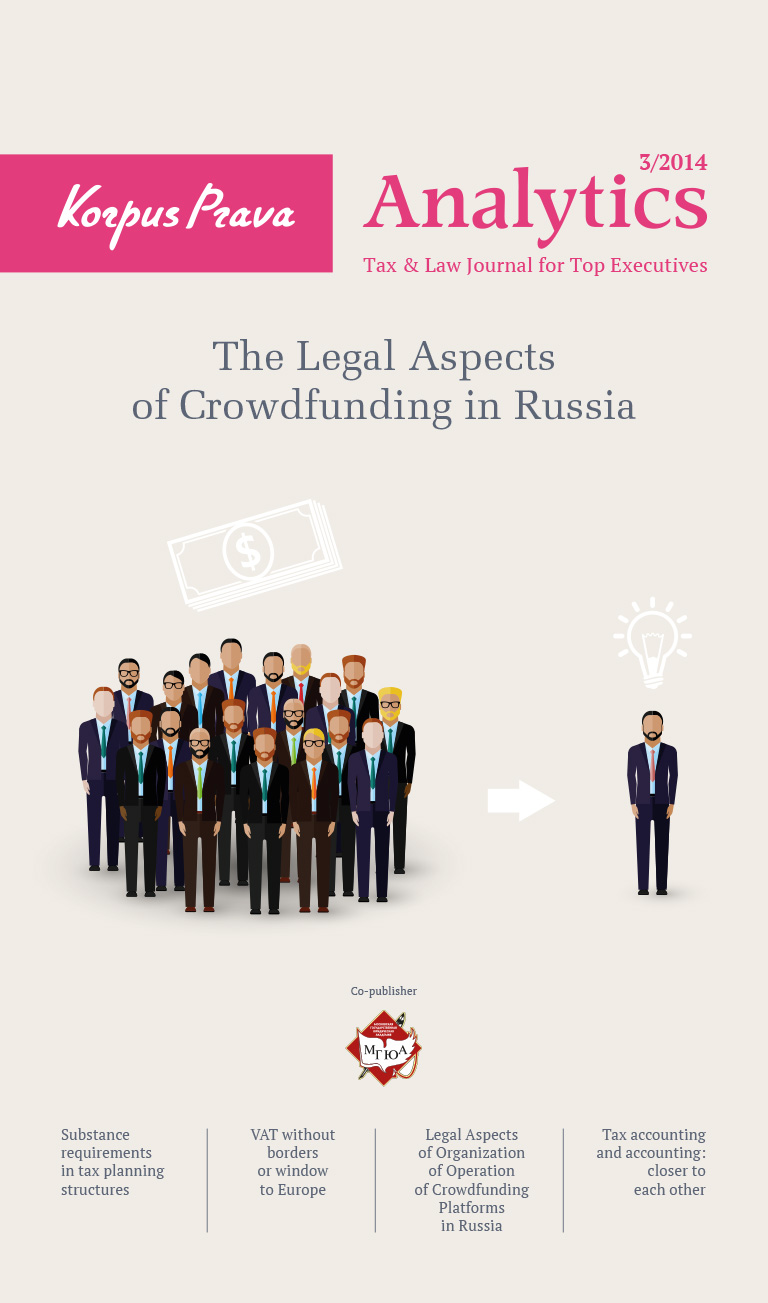- Cyprus Citizenship Scheme for Foreign Investors
- Squeezed But Pleased: Taxation of Passive Income in the European Union
- VAT Without Borders or Window to Europe
- Legal Aspects of Organization of Operation of Crowdfunding Platforms in Russia
- Substance Requirements in Tax Planning Structures
- “Deposit Splitting” of Individuals. Legal Civil and Criminal Aspects
Inheritance Fund: Innovation in the Civil Law
Many people see earning money not just as a necessity, but as a fascinating process, which often results in a certain amount of undistributed assets. Sooner or later each person faces the question: What now?
There are bank accounts, immovable and movable property and heirs. How does one properly arrange the transfer of assets? Who does one transfer them to and with what reservations? Answers to these questions are not always clear and obvious.
Historically, not all wealthy people pass their wealth to apparent heirs. Wills are drawn up not only in favour of strangers, but sometimes even pets get lucky. Obviously, such wills are disputed over, and often the court takes the side of the relatives of the deceased.
High-profile cases of will disputes become public, such as the renowned Nobel’s will. Everyone knows that the famous inventor wrote a will according to which his savings went to the Nobel Foundation. Nowadays, there is hardly anyone who has not heard about this jury prize, which is awarded annually in Stockholm. This tradition was initiated on November 7, 1895, when the scientist drew up the following will at the Swedish-Norwegian club in Paris:
“I, the undersigned, Alfred Bernhard Nobel, after mature deliberation, hereby declare the following to be my last will and testament with regard to such property as I may leave upon my death… The capital, converted to safe securities by my executors, is to constitute a fund, the interest on which is to be distributed annually as prizes to those who, during the preceding year, have conferred the greatest benefit to humankind.
The interest is to be divided into five equal parts and distributed as follows: one part to the person who made the most important discovery or invention in the field of physics; one part to the person who made the most important chemical discovery or improvement; one part to the person who made the most important discovery within the domain of physiology or medicine; one part to the person who, in the field of literature, produced the most outstanding work in an idealistic direction; and one part to the person who has done the most or best to advance fellowship among nations, the abolition or reduction of standing armies, and the establishment and promotion of peace congresses.
… It is my express wish that when awarding the prizes, no consideration be given to nationality, but that the prize be awarded to the worthiest person, whether or not they are Scandinavian”.
Thus, the most renowned inheritance fund has been created.
The idea of inheritance funds has widely spread throughout Europe, and it is widely known that our fellow countrymen use this option to distribute their assets after death.
In 2018, amendments to the Civil Code regulating the institute of inheritance funds entered into force. Thus, our legislator is trying to adapt the Russian law to the requirements and demands of the modern world.
The process of creating inheritance funds in Russia has just begun, and apparently, in the near future, the Civil Code will be amended to reflect up-to-date requirements, so that these regulations will actually work, rather than remain ink on paper.
So then, what is the Inheritance Fund in accordance with the Russian law?
In accordance with the Civil Code, the Inheritance Fund is a fund created in the manner prescribed by the Civil Code, pursuant to the will of the citizen and on the basis of his property, engaged in the management of such citizen’s property received under the succession by inheritance permanently or for a specified period of time in accordance with the management terms of the inheritance fund.
Under the specified circumstances, in order for the property to be placed under management as the Inheritance Fund after the death of a citizen, several conditions should be met.
Firstly, the creation of the fund should be mentioned in the will. In addition, the will providing for the creation of an inheritance fund should include:
- Resolution of the testator on the creation of the inheritance fund;
- The charter of the fund determining the structure of its bodies;
- Management terms over the inheritance fund which shall contain:
- Provisions on the transfer to beneficiaries of the fund or to certain categories of persons of all the property of the inheritance fund or part thereof, including under the circumstances the occurrence thereof is unknown.
- The procedure for the transfer to beneficiaries of the fund or certain categories of persons of all or part of all the property of the fund or part thereof, including income from the fund’s activities.
The procedure shall indicate the type and size of the transferred property (property right) or the procedure for their determination, period or frequency of the property transfer, and also circumstances upon the occurrence of which such transfer is performed.
Such will should be notarized.
Secondly, the notary in charge of the inheritance case should perform certain actions determined by the legislator:
- To send an offer to give consent to the exercise of powers of the sole executive body of the inheritance fund to a person who in accordance with the resolution on the creation of the inheritance fund is appointed by the sole executive body of the inheritance fund (or may be defined as a person to whom these powers are assigned);
- To send an application for the creation of the inheritance fund to the authorized registration authority with the resolution on the creation of the fund and the charter attached. This application shall be sent no later than three days after the opening date of the inheritance case;
- To issue the certificate of inheritance rights to the fund after its creation.
The property of the inheritance fund is formed upon the creation of the fund in the course of its activities, as well as by the income from the management of the property of the inheritance fund.
There should be noted that according to the current legislation, funds should pursue social, charitable, cultural, educational or other socially useful purposes. However, the inheritance fund is created in the interests of beneficiaries, which contradicts the law “On Non-Profit Organizations”. The legislator is likely to correct this defect in the near future, but at the moment it is still effective.
Beneficiary
Beneficiaries are persons that may receive the property of the fund in part or in full.
Beneficiaries may be either heirs or other citizens that are not related to the deceased person, or even the unborn. One may become a beneficiary under certain conditions, as in the example given at the beginning of the article with the Nobel Foundation.
The legislator has banned appointment of a commercial organization as a beneficiary. The beneficiary is not allowed to act as the sole executive body of the inheritance fund and as a member of the collegial executive body of the inheritance fund.
Beneficiaries are entitled to:
- Receive part or all of the fund’s property, including income from its activities, in accordance with the management terms;
- Receive information about the fund’s activities in accordance with the management terms;
- Require an audit of the fund’s activities at its own expense; by resolution of the board of trustees, the beneficiary may be reimbursed for the cost of the auditor’s services.
The rights of a citizen as a beneficiary of the inheritance fund are not inheritable; they are inalienable, and not subject to forfeiture over obligations of the beneficiary. The beneficiary is not liable for the obligations of the inheritance fund, and the fund is not liable for the obligations of the beneficiary.
In order to understand the connection of the beneficiary with the fund’s property, one may compare it with the participation in a limited liability company. Thus, if a company owns real estate, participants of the company are not entitled to dispose of this property at their own discretion, however, the property may be transferred to them after the liquidation of the company. Participants are also entitled to income in the form of dividends received by the company from property management.
Creation of an inheritance fund is a convenient method to keep the business after the death of its owner. Thus, if heirs have no idea or ability to continue the family business, it is better to place it under management through the established fund.
In addition, the transfer of assets to the inheritance fund allows to withdraw persons who are heirs with a mandatory share from the circle of heirs.
The emergence of the inheritance fund concept in the Russian legislation is obviously a positive thing, but there are a few unfinished issues that sooner or later will have to be considered by our legislator.
Firstly, the fund may be created only after the death of the testator. Although, judging by the foreign experience, it is more reasonable to create such a fund during the lifetime of the assets owner. In this case, the testator may assess the fund’s efficiency, as well as monitor and follow the process of the fund’s creation.
Secondly, only one person may establish an inheritance fund, while the property of spouses is jointly owned. The joint will, as well as the joint inheritance fund make it easier to transfer family assets to heirs.
Thirdly, there is no regulation covering taxation of income received by heirs from the fund’s activities. Given that inheritance income is exempt from taxation, it would be logical to assume that payments to beneficiaries from the activities of the inheritance fund would also be either tax exempt or a preferential tax rate would be introduced.
Your subscription to our journal will definitely boost the efficiency of your specialists and downsize your expenses for consultants.
The journal is available free of charge in the electronic version.
Free Download

